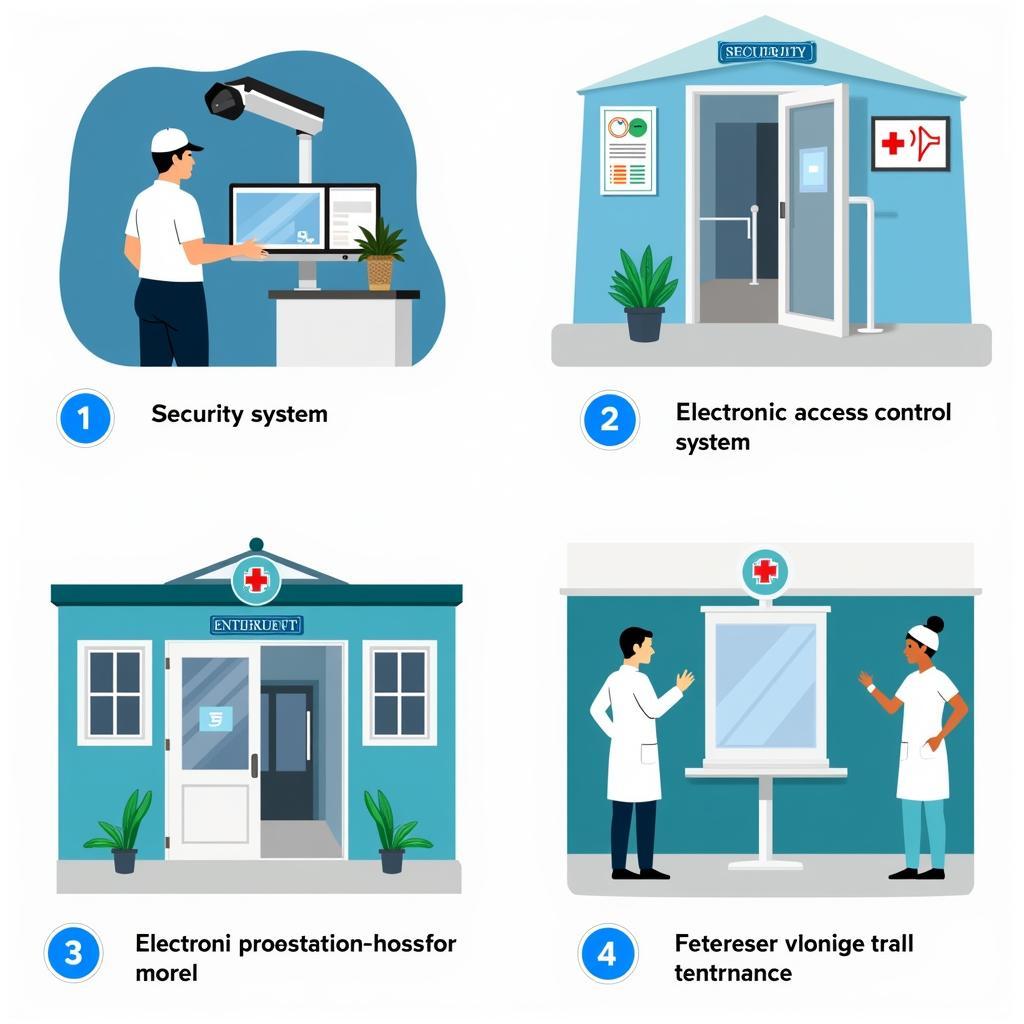Security At Hospital is paramount. It’s about creating a protected space for patients, staff, and visitors alike, ensuring peace of mind and promoting healing. From controlling access to responding to emergencies, hospital security plays a vital role in maintaining a safe and secure environment. We delve into the multifaceted aspects of hospital security, exploring its importance, challenges, and best practices.
Hospitals are unique environments with diverse populations and complex operational requirements. Effective security measures must address a range of potential threats, including theft, violence, unauthorized access, and even infant abductions. These challenges are compounded by the 24/7 nature of hospital operations and the presence of vulnerable individuals.
The Importance of Security at Hospitals
Hospital security isn’t merely about preventing crime; it’s integral to the overall healing process. A secure environment reduces stress and anxiety for patients, enabling them to focus on recovery. It also fosters a sense of safety for staff, allowing them to perform their duties effectively. Moreover, robust security measures protect valuable equipment and resources, ensuring the hospital’s continued ability to provide quality care.
Key Elements of Hospital Security
Effective hospital security comprises several key elements, working in synergy to create a comprehensive security system. These include:
- Access Control: Restricting access to sensitive areas, such as operating rooms and maternity wards, is crucial for preventing unauthorized entry. This is often achieved through electronic access systems, security personnel, and visitor management protocols.
- Surveillance Systems: CCTV cameras strategically placed throughout the hospital provide constant monitoring and deter criminal activity. These systems also aid in investigations and provide valuable evidence in case of incidents.
- Emergency Response: Hospitals must have well-defined procedures for responding to various emergencies, including fires, natural disasters, and active shooter situations. Regular drills and training ensure staff are prepared to act swiftly and effectively.
- Security Personnel: Trained security officers play a vital role in patrolling the premises, responding to incidents, and enforcing security protocols. Their presence provides a visible deterrent and offers a sense of reassurance to patients and staff.
 Hospital Security Measures: Access Control, Surveillance, and Emergency Response
Hospital Security Measures: Access Control, Surveillance, and Emergency Response
Addressing Security Challenges in Hospitals
Hospital security faces numerous challenges, including:
- High Traffic Volume: Hospitals experience a constant flow of patients, visitors, and staff, making it difficult to monitor everyone effectively.
- Diverse Population: Hospitals cater to individuals from all walks of life, some of whom may be experiencing emotional distress or have mental health issues, increasing the potential for unpredictable behavior.
- Open Environment: Maintaining a balance between security and accessibility is crucial. Hospitals must be welcoming while still ensuring the safety of everyone within.
Best Practices for Enhanced Security
Implementing best practices can significantly improve security at hospitals. These practices involve utilizing advanced technologies, developing robust procedures, and fostering a culture of security awareness.
- Advanced Technologies: Integrating technologies like facial recognition software, AI-powered surveillance systems, and smart access control can enhance security and streamline operations.
- Robust Procedures: Clearly defined protocols for visitor management, staff identification, and emergency response are essential for maintaining order and ensuring a swift response to incidents.
- Security Awareness Training: Regular training for staff on security procedures, emergency protocols, and recognizing suspicious behavior can empower them to contribute to a safer environment.
How Much Do Security Guards Make at Hospitals?
how much do security guards make at hospitals
Compensation for hospital security guards varies based on experience, location, and the specific hospital. This is an important consideration for individuals interested in pursuing this career path.
Hospital Security Duties and Responsibilities
hospital security duties and responsibilities
The duties and responsibilities of hospital security personnel encompass a broad range of tasks, from patrolling the premises to responding to emergencies and enforcing hospital regulations.
Hospital Security Job Duties: A Closer Look
A deep dive into the specific tasks performed by hospital security guards provides a comprehensive understanding of their crucial role in maintaining a safe and secure environment.
“Effective security at hospital is not just about having the right technology and personnel; it’s about creating a culture of safety where everyone feels responsible for contributing to a secure environment,” says Dr. Maria Sanchez, Director of Security at City General Hospital.
 Hospital Security Technology: Enhancing Safety and Efficiency
Hospital Security Technology: Enhancing Safety and Efficiency
“Investing in comprehensive security measures not only protects patients and staff but also enhances the hospital’s reputation and fosters trust within the community,” adds John Davis, a security consultant with over 20 years of experience in healthcare security.
In conclusion, security at hospital is a complex and multifaceted issue that demands constant attention and improvement. By implementing best practices, leveraging technology, and fostering a culture of security awareness, hospitals can create a safe and secure environment for everyone. This allows patients to focus on healing, staff to perform their duties effectively, and the community to have confidence in the institution’s commitment to safety.
When you need assistance, please contact us at Phone Number: 02437655121, Email: [email protected] Or visit us at: No. 298 Cau Dien Street, Minh Khai, Bac Tu Liem, Hanoi, Vietnam. We have a 24/7 customer service team.